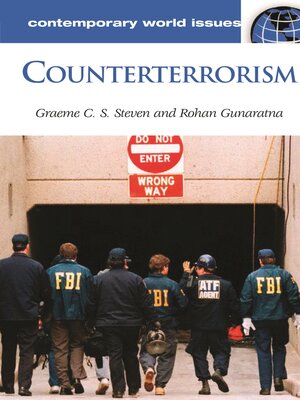Counterterrorism
ebook ∣ A Reference Handbook · Contemporary World Issues
By Graeme Colin Stracey Steven

Sign up to save your library
With an OverDrive account, you can save your favorite libraries for at-a-glance information about availability. Find out more about OverDrive accounts.
Find this title in Libby, the library reading app by OverDrive.



Search for a digital library with this title
Title found at these libraries:
| Library Name | Distance |
|---|---|
| Loading... |
An up-to-date analysis of the wave of terrorism in the post-Cold War era and the ways in which states and societies are responding.
Counter-Terrorism: A Reference Handbook outlines the threat of terrorism and ways to combat it. Written by two expert insiders in the field, this extensive examination surveys a wide range of diverse terrorist groups from the Provisional Irish Republican Army (PIRA) to Al Qaeda. It shows how key trends and patterns in domestic and international terrorism such as suicide bombings require counter strategies and tactics including surveillance and reconnaissance.
Case studies of terrorist organizations in Europe, Asia, Africa, Latin America, the Balkans, and the Caucasus, and profiles of terrorists like Khalid Sheikh Mohommad, alias Mokhtar (The Brain), who masterminded the Al Qaeda attack on 9/11, illustrate the growing network of groups and leaders harnessing the forces of globalization. Finally, the authors suggest lthat no single state can act effectively on its own to confront terrorism—instead, a wide range of strategies needs to be adopted by all.
Counter-Terrorism: A Reference Handbook outlines the threat of terrorism and ways to combat it. Written by two expert insiders in the field, this extensive examination surveys a wide range of diverse terrorist groups from the Provisional Irish Republican Army (PIRA) to Al Qaeda. It shows how key trends and patterns in domestic and international terrorism such as suicide bombings require counter strategies and tactics including surveillance and reconnaissance.
Case studies of terrorist organizations in Europe, Asia, Africa, Latin America, the Balkans, and the Caucasus, and profiles of terrorists like Khalid Sheikh Mohommad, alias Mokhtar (The Brain), who masterminded the Al Qaeda attack on 9/11, illustrate the growing network of groups and leaders harnessing the forces of globalization. Finally, the authors suggest lthat no single state can act effectively on its own to confront terrorism—instead, a wide range of strategies needs to be adopted by all.







